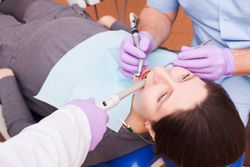
When you’re pregnant, caring for your body isn’t just a benefit to your health, but it’s also a benefit to your developing baby. As such, it’s important to take stock of all of the elements of your health, including dental care. If you’re expecting, here’s what you should know about visiting the dentist during pregnancy.
Is Dental Care Safe During Pregnancy?
Seeing a dentist is safe and highly recommended during pregnancy. If a treatment is necessary, your dentist might suggest waiting until the second or third trimester to get it done to minimize the stress on the body. However, procedures that are not necessary—such as teeth whitening—or require the use of general anesthesia may be postponed until after the baby is born.
What Oral Health Problems Are Common During Pregnancy?
1. Gingivitis
 During pregnancy, you will experience considerable hormonal changes that can increase plaque production in your mouth. In some cases, this plaque can cause an early infection of the gums known as gingivitis. When untreated, gingivitis can advance into gum disease—a condition that causes receding gums, tooth loss, and infections elsewhere in the body.
During pregnancy, you will experience considerable hormonal changes that can increase plaque production in your mouth. In some cases, this plaque can cause an early infection of the gums known as gingivitis. When untreated, gingivitis can advance into gum disease—a condition that causes receding gums, tooth loss, and infections elsewhere in the body.
2. Tooth Decay
If you experience a lot of morning sickness, there’s a chance your teeth are exposed to harmful stomach acids. These acids can wear away at enamel and contribute to the development of cavities. Many pregnant women also experience a decrease in calcium, as nutrients are used to support the development of the baby. In some cases, this deficiency can weaken teeth and increase cavity risk.
3. Pregnancy Tumors
Plaque buildup might create benign growths on the gums known as pregnancy tumors. In many cases, these growths will dissipate after pregnancy. However, if the tumor causes pain or makes it difficult to eat, your dentist can provide treatment to remove it.
How Can I Protect My Oral Health During Pregnancy?
In addition to visiting your dentist for routine oral exams, there are several ways you can protect your teeth and gums throughout pregnancy. It’s critical to maintain a solid oral hygiene routine. This care should include brushing twice a day, flossing at least once a day, and rinsing with mouthwash. If you experience morning sickness, rinse your mouth with water afterward to clear away harmful stomach acids. After 30 minutes have passed, brush your teeth with toothpaste. It’s also important to stay smart about nutrition; when you have cravings, try to opt for healthier snacks, such as fruits, over those that contain sugars and refined carbohydrates, as these ingredients can contribute to tooth decay.
When you’re expecting, Judy Walker, DDS, can help you greet your baby with a healthy, vibrant smile. Providing general dentistry services in Greensboro, NC, Dr. Walker offers in-depth cleanings and exams in a stress-free environment. If more advanced treatment is needed, this local dentist will guide you through the process in a safe and gentle fashion to better support your prenatal health. You can learn more about these treatment options online. To schedule an appointment, call (336) 275-1472 today.
About the Business
Have a question? Ask the experts!
Send your question

